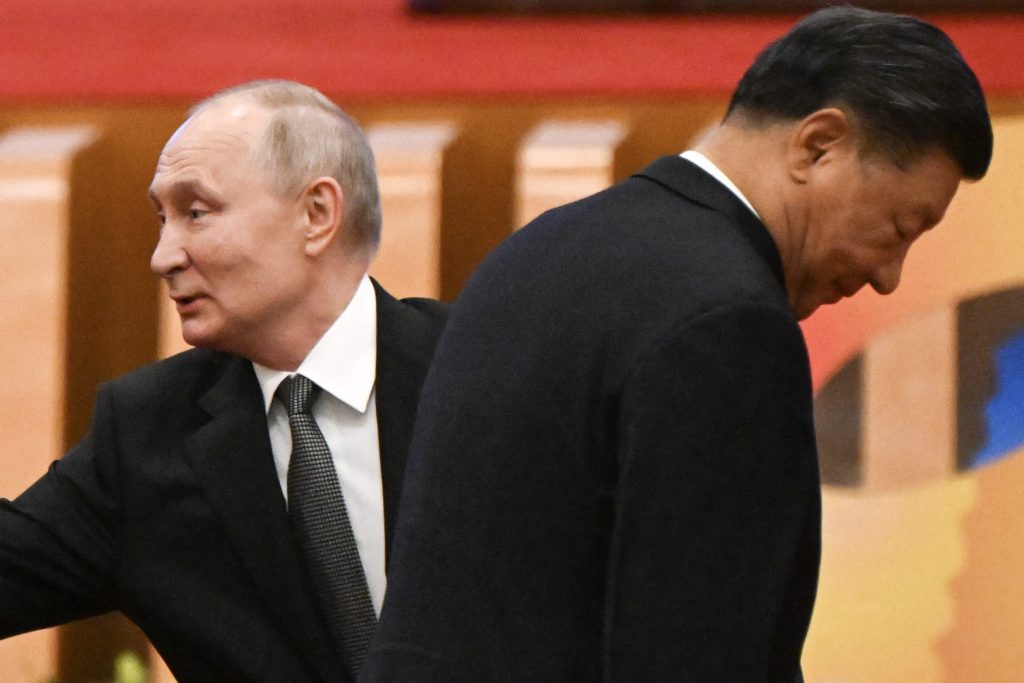NATO leaders attended a meeting of heads of allies and partners as part of the NATO Summit in Washington DC, USA on 11 July 2024.
Anadolu | Getty Images
“We are facing four dangerous countries that are increasingly cooperating,” he commented. Sky News reported.
“We in this country and in the NATO alliance have to be able to confront this particular quadrilateral problem as well as other problems that are prevalent in the world,” he added.
Robertson did not name the Quartet members specifically, but the other three are thought to be Russia, Iran and North Korea, which NATO described last week as posing a threat and systemic challenge to “Euro-Atlantic security”.
The use of the word “deadly” to allude to China coincided with intensifying Russian criticism of its ally at last week’s NATO summit, where Beijing’s status as an adversary was more openly acknowledged than ever before.
Chinese President Xi Jinping and Russian President Putin attended the opening ceremony of the third Belt and Road Forum for International Cooperation at the Great Hall of the People in Beijing on October 18, 2023.
Pedro Pardo | AFP | Getty Images
in Leaders’ DeclarationChina was described as a “critical enabler” of Russia’s war in Ukraine and poses a “systemic challenge to Euro-Atlantic security”, with the military coalition citing concerns about “continued malicious cyber and hybrid activities” and the diversification of Beijing’s nuclear arsenal and space capabilities.
NATO leaders meeting in Washington agreed that China’s “coercive” policies and ambitions threaten the “interests, security and values” of the NATO defence pact, labelling Beijing a major adversary of the alliance.
NATO’s declaration also states that the “deepening strategic partnership” between China and Russia is a “serious” concern, but it is clear that Russia and its ongoing war against Ukraine are the alliance’s most pressing concerns.
The coalition said Moscow had “subverted” peace and stability in the West and “seriously undermined global security.” Russia’s nuclear capabilities, malicious cyber activities, provocations on allied borders and hybrid actions through proxies were all cited as particular threats.
Russia’s allies, North Korea and Iran, have also been accused of “fueling Russia’s war of aggression” against Ukraine by providing Russia with direct military support, including munitions and unmanned aerial vehicles (UAVs), which NATO said has “severe implications for Euro-Atlantic security and undermines the global nuclear non-proliferation regime.”
Russia and North Korea have denied any arms transfers, and Iran has previously said it has supplied Russia with drones. However, he claimed to have shipped them before the war began.China has been threatened with sanctions after being accused of sending “dual-use” materials, including weapons parts and equipment, to Russia’s defence sector for use in its own arms production.
China denies supplying arms to Russia Chinese Foreign Ministry spokesman Lin Jian was reported to have described NATO’s latest remarks as “biased, slanderous and provocative.” He also dismissed NATO as a “relic of the Cold War.” The Chinese delegation to the European Union said NATO’s statements were “full of Cold War mentality and bellicose rhetoric.”
Ian Bremmer, founder and president of the Eurasia Group, said the recent NATO summit showed that Western powers and their opponents appear to be on a “new Cold War footing.”
In emailed comments Monday, he said viewing China as a major adversary “will increase pressure to decouple from China in areas of strategic importance to Europe… And given the presence of Asian allies as strategic partners in NATO, Beijing will increasingly feel like a broader containment measure that could lead the world towards a new Cold War posture.”
It remains to be seen how the West will be able to counter these adversaries: Russia, North Korea and Iran are already subject to significant international sanctions, and it is no exaggeration to say that these restrictions on trade and key sectors have only brought these countries closer together.
Lumping China together So-called “rogue nations” One security expert said this was an important step for NATO, but it remains unclear how Western countries will counter a hostile power axis.
“The declaration states, ‘China [People’s Republic of China] “They said, ‘We cannot have the largest European war in recent history without damaging the interests and reputation of our allies.’ This is a significant step in the allies publicly declaring their hostile intentions,” said Ed Arnold, senior fellow for European security at the International Security Division, a think tank at the Royal Institute for Security Studies.
“But the report mainly identifies and praises the problems, but does not tell us what NATO should do about them,” he said in a commentary last week.
Holger Schmieding, chief economist at Berenberg Bank, said while Western economic dominance could lead to victory, adversaries put severe strain on their own economies and resources by waging wars, like Russia, or supporting conflicts elsewhere, like North Korea and Iran.
“In an increasingly multipolar world, Western free and advanced democracies face unprecedented challenges,” Schmieding said in an email on Monday.
“Russia is waging a fierce war against its European brothers and sisters, and China is aggressively asserting its power,” he said.
“It is easy to be pessimistic about the prospects of developed countries as defenders of freedom, peace and democracy. But that is a mistake. Time is not on the side of the West’s enemies. China’s share of world GDP [gross domestic product] Although it appears to have peaked, Russia will struggle to continue a costly war for several more years, and Iran is increasingly turning into an economically strapped state with very limited resources, as North Korea already is.”
Schmieding said the “West” has superior resources and that “if they step up, support Ukraine, pay for its defense, and muster the will to fight the long game, the West can win while the troublemakers suffer the consequences of over-expanding their economies.”


